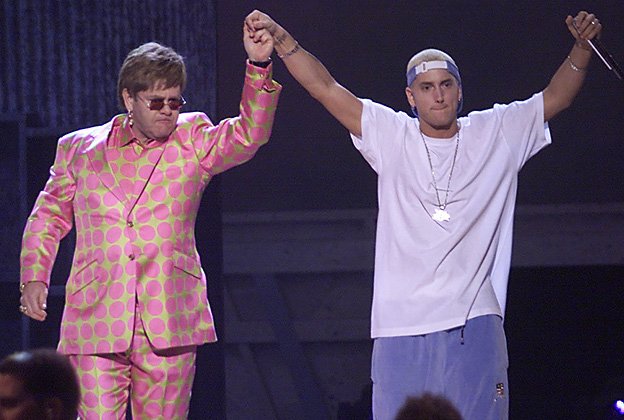Rocket Stan — Unpacking Music's Most Uniquely Wholesome Friendship
/The other day, as I made my way to work, Spotify blessed my ears by shuffling Tupac Shakur’s “Ghetto Gospel” into my daily mix. I was pleasantly surprised to hear the voice of Sir Elton John belting the chorus.
“Those who wish to follow me, I welcome with my hand. And the red sun sinks at last into the hills of gold, and peace to this young warrior without the sound of guns.”
Elton john & Eminem at the 2001 grammy awards - courtesy of rolling Stone
Curious of how these two musical legends came together for such an epic song, I sought out the world’s foremost authority on random trivia: Wikipedia. I did not expect to learn this collaboration was the brainchild of Marshall ‘Eminem’ Mathers, who sampled John’s 1971 “Indian Sunset” with unreleased lyrics for his production of Shakur’s fifth posthumous album, 2004’s Loyal to the Game. Speaking to The Guardian in 2005, Elton said of Eminem’s product, “How he’s managed to meld that with Tupac, I’ll never know. It’s just genius.”
This revelation got me thinking more about the unusual friendship between the Rap God and the British icon, which famously started at the 2001 Grammy Awards, where the two performed Eminem’s hit “Stan.” John provided vocal and piano accompaniment in place of Dido, who featured on the album version of the song. When the curtain was drawn to reveal his presence, the crowd expectedly lost their minds. As the performance ended, the two men hugged and held hands to the sound of thunderous applause.
A month later, the duo once again embraced on stage during the 2001 Brit Awards when John presented Eminem with the year’s “Best International Male Solo Artist” award.
On stage at the 2001 brit awards - courtesy of yahoo
By the time of these public appearances, Eminem had quickly become one of music’s most controversial figures, with many having criticized his use of violent, misogynistic and homophobic lyrics. Speaking to Zane Lowe of Beat’s 1 in 2017, the British rocker shared that he never believed Marshall’s lyrics professed personal hatred or animosity for the gay community. “For me, Eminem was never homophobic. I listened to the whole of the Marshall Mathers album when I drove to a show in South Hampton … he’s just writing about the way things are. Not how he thinks, but the way things are.”
Later that year, while appearing on the Graham Norton Show, Sir Elton doubled down in his defence of Eminem and his lyrics. “He was accused of being homophobic by so many people, which I thought was nonsense. And I came out in support of the fact that he isn’t.” Not a minute later, he would further elaborate just how misguided everyone’s views of the rapper were.
“When David [Furnish – John’s husband] and I did our civil partnership, I got this package from Eminem … we had two diamond encrusted c**k rings on velvet cushions.”
I don’t know about you, but no true homophobe would ever gift such intimate items if their heart was genuinely poisoned by hatred.
The pair at the 2020 oscars - courtesy of @eminem on instagram
Joking aside, Marshall and Elton’s relationship extends far beyond the latter’s defence of the former’s lyrical content. In 2009, Mathers told The Guardian, “When I first wanted to get sober, I called [Elton] and spoke to him about it. He’s somebody who’s in the business who can identify and relate to the lifestyle and how hectic things can be … I reached out to him and told him, ‘Look, I’m going through a problem and need your advice.’”
John – who entered rehab in 1990 for his own alcohol addiction – has been nothing but supportive of his friend’s path to recovery. No matter where he was in the world, in the early days of Marshall’s struggle, Sir Elton would call and check in every day.
“Your sobriety date is in my calendar,” John told Marshall in 2017. “I’m so happy you exist in the world, and I’m just so proud of you.”
“Thank you, Elton,” the rapper replied. “I love you too.”
Whoever is cutting onions really needs to stop.
Connor Burk
Connor is in his second year of Algonquin’s Professional Writing program. He has been obsessed with rap music since being introduced to Eminem at an inappropriately young age




